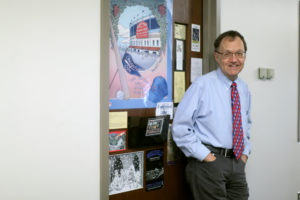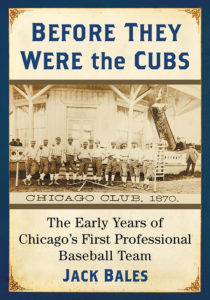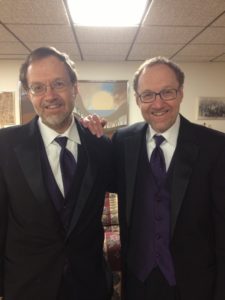On a hot June day, UMW Reference and Humanities Librarian Jack Bales left Illinois in a U-Haul truck with no AC. After grad school and jobs at two college libraries, he’d accepted a new one at Mary Washington. But, as he rounded the I-95 beltway near D.C., he thought he’d made a mistake. So far from home, he didn’t know anyone. He didn’t plan to stay long.

UMW Reference and Humanities Librarian Jack Bales has written a new book, “Before They Were the Cubs: The Early Years of Chicago’s First Professional Baseball Team.” It’s due out this spring. Photo by Karen Pearlman.
Nearly four decades later, surrounded by “marvelous, wonderful colleagues,” Bales claims his job at Simpson Library is the best one on campus. Like a good read, he devours Mary Washington, answering questions for students, faculty and staff, teaching library classes, and tending to Simpson’s collection of books. He works out in Fitness Center and eats lunch in the UC.
But Bales lives and breathes something else, too: The Chicago Cubs.
His writings about the major league team have been published far and wide, and his new book, Before They Were the Cubs: The Early Years of Chicago’s First Professional Baseball Team, is due out any day. Published by McFarland & Company, it covers the Cubs’ rarely addressed formative years. And in true librarian style, it cites thousands of original sources.
Next up? Another Cubs book, this one about a woman who shot her ex-boyfriend, a Chicago Cubs player, in 1932. “We’re talking attempted murder, stolen love letters, blackmail, a burlesque show, sex and, of course, baseball,” he said. “What else is there?”
Q: What inspired Before They Were the Cubs?
A: I grew up outside of Chicago and had followed the Cubs here and there. I thought I’d dig around and see if there was a Cubs era that hadn’t been covered in great detail. I’ve written quite a few articles, essays and books, and after my last big project I was thinking about branching off into an entirely new area, one more popular in nature than my previous works of literary research and biography.
Q: How long did you work on it?
A: I got the idea in 2004 and wrote the first sentence in July 2012. It took years of research and writing (remember, I have a full-time job), and since some of the newspapers I needed to consult aren’t available online, I spent years going through microfilm page-by-page. I’d spend every Christmas vacation camped out by the library’s microfilm reader-printers. One of my colleagues still remembers coming in to find my CD player, sweater, water bottle, snacks – even my bedroom slippers – all neatly arranged beside reels of microfilm. My colleagues’ interest and support have helped keep me going.
Q: Anything stand out to you during your research?
A: My favorite example is a previously unknown drawing of the team’s 19th-century ballpark that I happened to find by going through microfilm of the old Chicago Evening Post newspaper. I have it in the book.
Q: How has Simpson kept up with rapidly evolving technology?
A: It’s not a question of libraries keeping up—libraries have been leading the way! In UMW’s Digital Archiving Lab, staff and students digitize unique materials, work on data projects and preserve digital content. Special Collections and University Archives maintain a variety of print and digital collections, including honors papers, yearbooks and the student newspaper. They also archive UMW websites, social media pages and campus blogs. And students explore 3D design and printing in the library’s ThinkLab.
Q: How many requests for help do you get?
A: In just 2018, library staff members answered more than 2,600 reference questions and conducted 572 consultations on research and other projects with 851 students.
Q: What one thing people would be surprised to learn about you?
A: I have an identical twin brother. We used to go out with the same girls.

